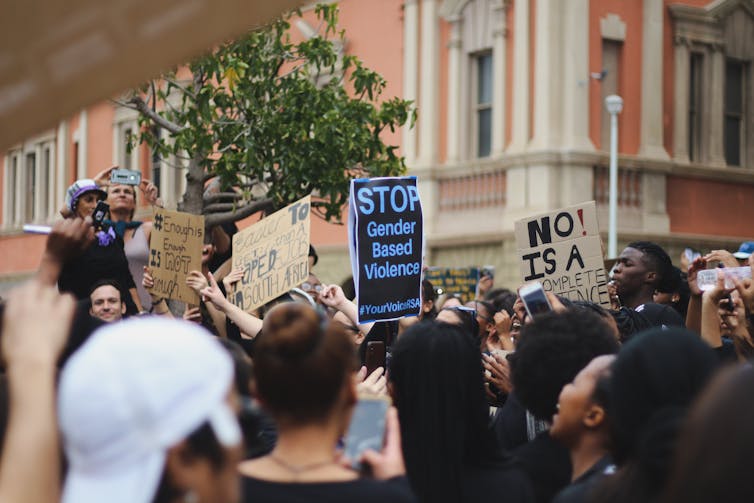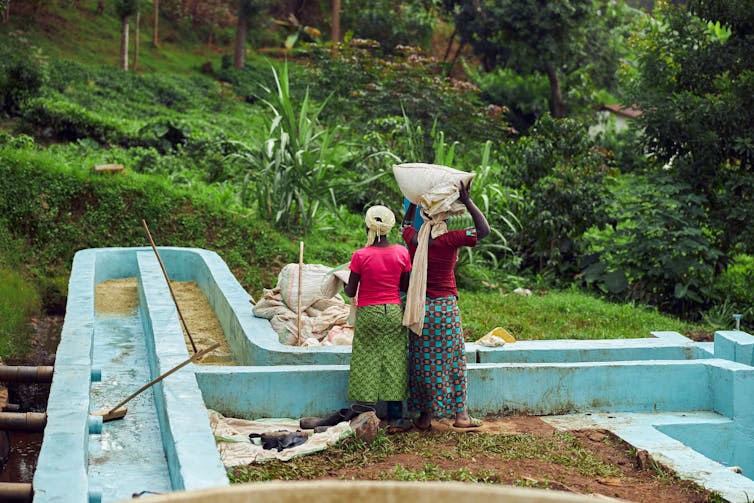[ad_1]
One in three ladies all over the world will expertise violence from an intimate associate sooner or later of their lifetime. That may be a surprising determine. Much more surprising, although, is the truth that, in 23 nations – from the Americas and Africa to Asia and the Pacific – it’s extra like two in three ladies.
As a part of a examine of nations with a excessive prevalence of violence towards ladies, we analysed information from the World Well being Group, the World Financial institution, the United Nations and educational sources. We discovered that nations which have been colonised are 50 occasions extra prone to have a excessive prevalence of intimate-partner violence towards ladies. When a patriarchal society is mixed with a historical past of colonialism, the danger of home violence will increase.
Postcolonial students have been telling us as a lot for many years. From widespread poverty to racial discrimination and gender inequalities, colonisation put in place methods and constructions which might be usually on the root of heightened violence towards ladies.
Colonial insurance policies
Many colonial methods of governance have been primarily based on “racialising” the native inhabitants: categorising and marginalising teams of individuals based on race or ethnicity. For instance, the divisions between Hindus and Muslims in pre-partition India and the racial hierarchy instituted in apartheid South Africa. These divisions have supplied the fodder for most of the world’s up to date armed conflicts. Students discuss colonial durabilities to explain the way in which by which colonial histories proceed to actively form the world at present.

Bohemian Pictures | Shutterstock
The 1994 Rwandan genocide is a working example. Over 800,000 largely Tutsi individuals have been killed by Hutu extremists – two teams which have been initially racialised by the Belgian colonial authorities, by the creation of hierarchical and unique types of citizenship. The genocide noticed widespread sexual violence used towards Tutsi ladies as a method of actually stripping them of their humanity.
Survivors of the genocide have been severely traumatised. Analysis exhibits that this trauma elevated males’s probability to make use of violence towards their households and intimate companions. It additionally lowered ladies’s capability to forestall it.
Many colonial methods of governance additionally established laws and authorized frameworks that have been notably damaging for girls. Even if each women and men have been in positions of management in pre-colonial Nigeria, British colonial officers refused to barter with feminine chiefs. In addition they put in place a system of land possession that explicitly excluded ladies.
The legacy of those insurance policies is that girls are nonetheless far much less prone to personal land than males in Nigeria. A current examine of nationwide information has proven that girls who don’t personal land usually tend to report home violence than those who do. It’s because land possession offers ladies revenue and energy inside a relationship. It additionally offers them choices after they want someplace to go. Ladies who’ve energy and alternate options are merely much less prone to put up with violence and extra prone to go away.
Historic trauma
Whereas individuals at present could not have personally skilled colonialism, they could expertise the historic trauma of their communities. Occasions shared by a whole group or ethnic group can lead to trauma being handed on by generations.
Trauma is usually outlined as a situation that arises from an occasion up to now – equivalent to baby abuse, or publicity to a pure catastrophe. Historic trauma is totally different. It doesn’t finish when the one that skilled the occasion recovers or passes on. In reality, analysis exhibits it’s usually compounded by the discrimination and oppression skilled by subsequent generations.

Yaroslav Astakhov | Shutterstock
Psychiatrist and political thinker Frantz Fanon first set the stage for understanding the emotional and psychological penalties of historic trauma arising from colonisation. In Black Pores and skin White Masks (1967), Fanon argued that the illustration of the colonial archetypal hero as white leaves black people in postcolonial societies with a need to be another person. They’re thus robbed of their sense of self, their company and their decision-making energy.
Working with First Nations communities in Canada, ladies’s rights practitioner Karen Max argues that we have to take a look at how communities perceive violence towards ladies as stemming not simply from gender inequalities however from the traumatic experiences of males in the neighborhood.
In a lot the identical method, the traumatic experiences of earlier generations can affect the breakdown of social networks and household attachments inside communities. Canada’s residential faculty coverage noticed First Nations kids forcibly faraway from their households all through the twentieth century. Analysis exhibits the long-term affect on First Nations communities of this coverage contains increased charges of home violence, emotional detachment and suicide.
A historical past of colonialism is, after all, not the one driver of violence towards ladies. Different vital elements embrace social norms that place ladies as inferior to males and deserving of violence in sure conditions. Nevertheless, our analysis exhibits that colonialism makes these different danger elements even worse.
[ad_2]
Source link














